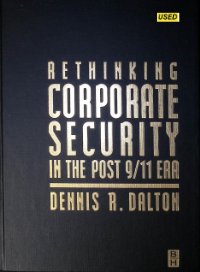By Dennis R. Dalton
The attacks on the World Trade Center and the Pentagon on September 11, 2001 changed the way the world thinks about security. Everyday citizens learned how national security, international politics, and the economy are inextricably linked to business continuity and corporate security. Corporate leaders were reminded that the security of business, intellectual, and human assets has a tremendous impact on an organization's long-term viability.
In Rethinking Corporate Security, Fortune 500 consultant Dennis Dalton helps security directors, CEOs, and business managers understand the fundamental role of security in today's business environment and outlines the steps to protect against corporate loss. He draws on the insights of such leaders as Jack Welch, Bill Gates, Charles Schwab, and Tom Peters in this unique review of security's evolving role and the development of a new management paradigm.
* If you truly wish to improve your own skills, and the effectiveness of your Corporation's security focus, you need to read this book
* Presents connections of theory to real-world case examples in historical and contemporary assessment of security management principles
* Applies classic business and management strategies to the corporate security management function
NY. BUTTERWORTH/HEINEMANN. 2003. 346p.



